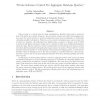Free Online Productivity Tools
i2Speak
i2Symbol
i2OCR
iTex2Img
iWeb2Print
iWeb2Shot
i2Type
iPdf2Split
iPdf2Merge
i2Bopomofo
i2Arabic
i2Style
i2Image
i2PDF
iLatex2Rtf
Sci2ools
108
click to vote
ICDM
2007
IEEE
2007
IEEE
Private Inference Control for Aggregate Database Queries
Data security is a critical issue for many organizations. Sensitive data must be protected from both inside and outside attackers. Access control policies and related mechanisms have been used for several decades to prevent unauthorized users from accidentally or deliberately extracting sensitive information. However, access control mechanisms alone cannot ensure the security of a database. An authorized user might invoke a sequence of queries, each of which is under his privileges, but whose results can be combined to infer some additional information about the data. Various “inference control” methods have been developed in the past to prevent users from inferring sensitive information through a sequence of queries. Private inference control provides privacy properties to both database owners and users making queries. It protects the database owner by limiting access to the data according to a specified inference control policy, but also to protect the user by preventing the da...
Related Content
| Added | 03 Jun 2010 |
| Updated | 03 Jun 2010 |
| Type | Conference |
| Year | 2007 |
| Where | ICDM |
| Authors | Geetha Jagannathan, Rebecca N. Wright |
Comments (0)

